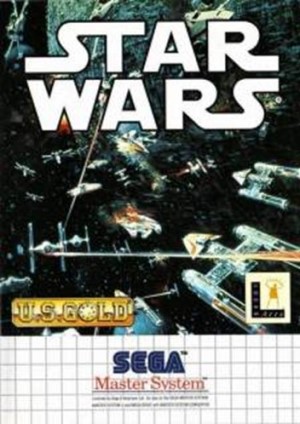
This game and I have a little bit of history. Up until 2012 Star Wars held the accolade of being the only NES title I had ever played, and that was briefly in a long-forgotten computer shop in Derby about where M&S currently stands. Or is it Debenhams? The game also kept me company when my brother borrowed it for his Game Boy and ... I was hopeless at it. Back then it was by far one of the hardest console games around. It had slightly slippery controls, the annoying NES "bounce back" (i.e. involuntary leaping backwards when hit/touched by an enemy - a feature of many 8-bit Nintendo games), enemies with annoying attack patterns, and weapons that were distinctly underpowered.
The game starts you off as Luke Skywalker flying about Tattooine in the old Landspeeder. The aim here is to find Obi-Wan, rescue R2-D2 from the Jawas (I don't remember them wielding huge guns in the film), and pick up bits and pieces before heading to Mos Eisley. This is where you hook up with Han Solo and you're off. Unusually for a film license, the levels, with some concessions to video game design, follow the plotting fairly closely. Once you're offworld you have to guide the Millennium Falcon through a first person asteroid debris field, then it's wander-around-the-Death-Star time, deactivating the tractor beam, rescuing Leia, and escaping the trash compactor (unfortunately, you don't replay Obi-Wan's light sabre duel with Darth Vader). With the platforming done, our heroes escape while fending off Tie-Fighters, before switching to the rebel assault on the Death Star and the final trench run - seen from above. It's a game that, rare for the time, brought together different styles under one roof. Nor was it a quick knock-off to capitalise on the lucrative licence; some thought has gone in to reproducing the film's key sequences.
The Master System port, gameplay-wise, is virtually identical to its Nintendo counterparts. The same "challenging" mechanics are present, except the graphics are spruced up and the soundtrack has received a decent makeover. For a system not known for its audio acrobatics, the programmers did a good job of wringing top tuneage out of the MS's weedy sound chip. And yes, it's bloody, bloody hard. It's one of them you would have needed weeks of spare time and infinite patience to get through 20-odd years ago - thank goodness for save states and walkthroughs.
What Master System Star Wars demonstrates, as well as its brethren on the other systems, is yet another marked shift in game culture. These modern views pan it for some distinctly unfriendly features, whereas upon its release Star Wars was very well received. As we've seen before, tough difficulty bordering on unfair was par the course in yesteryear. Thanks to hardware and memory limitations, games had to be relatively simple affairs. And yet they had to command enough attention to prevent the punter feeling ripped off, so a steep challenge was considered an appropriate answer to the challenge of game longevity. There is nothing in Star Wars that hadn't already featured in dozens of other 8-bit platformers. Irksome movement momentum, leaps of faith, unfairly-placed enemies, this was par the course. For players who either didn't grow up with the demands some games made, or if more mature players have grown habituated to having their hands held by modern interfaces, a game like this can appear downright disrespectful. But no, all it required was patience - if you expect instant pow-wow, you will be destroyed.
Overall, there's a good game here if you're prepared to take it on its own terms. Not a timeless classic, but a worthwhile spin.
No comments:
Post a Comment